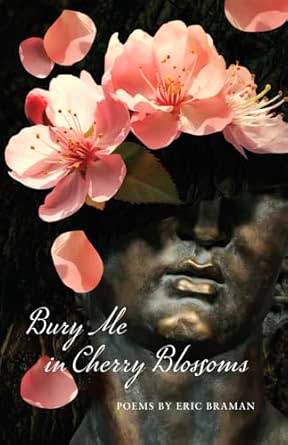
The flowery pink cover and enchanting title of Eric Braman’s premiere romance poetry book, Bury Me In Cherry Blossoms, makes you think that you will be reading only dreamy yet bittersweet stanzas about falling in love.
However, once you flip to the first page, Braman strikes readers with violent anecdotes about gasoline, lava rocks and a toothbrush. “I knew I wanted to include a toothbrush even though I hate the topic of the poem, but it’s a poem I feel really proud of because I looked at the ugly parts of myself and the ugly parts of the things that surround me and make up who I am,” Braman says. “Toothbrush,” the first poem of the collection, starts readers on a journey of self-hatred and the woes of being queer.
Braman started their love of poetry secretly in high school. “I didn’t tell anyone because it was a very gay thing to do, and I was very much straight,” Braman says. It wasn’t until college that Braman began sharing their poetry with other people.
Braman studied theatre at Western Michigan University and went to the University of Oregon to study nonprofit management with an emphasis in community arts, but in 2015 they were having a difficult time finding theater opportunities. Out of this struggle came the Dead Parrot Society, a writers support group, which included Braman and a couple of their good friends. “We created the Dead Parrot Society to kill the parrot on our shoulder that was telling us that we’re not good enough,” Braman says.
Braman’s published collection originated over a decade ago from this group. In the poem “A Shot of Whiskey,” Braman begins with the Dead Parrot Society prompt “a shot of whiskey.”
The poem takes the reader through four poems dedicated to all forms of queer love. “I started the poem off thinking this is about four moments where I had whiskey, and then I realized, ‘Oh no, this is about coming out; this is about love,’” Braman says.
Throughout the collection, Braman takes us through their journey of being queer and gender non-binary, through comforting poems like “Chamomile” and heart-wrenching ones like “Learning to Drive.”
“Chamomile” follows Braman through their journey with therapy, in which they had chamomile tea in every session for comfort. “Learning to Drive” features the physical harm we put ourselves through. The juxtaposition of the two shows the non-linear path of mental health. “Mental health isn’t just a destroyer or something you have to overcome, it’s also something that just is incorporated into life and has its highs and its lows,” Braman says.
Braman ends their collection with the poem that is the cover’s namesake, which explores the limitless bounds of nature in contrast to the bounds of society’s view on gender identity. “That poem became this kind of wish and this want to be able to access what nature can access, which is masculine and feminine,” Braman says.
Braman hopes that the poetry collection will allow queer folks to see the parts of themselves that they don’t often get to see. “I hope it challenges the way that people understand the queer experience; name any queer movie, and it’s either beautiful or horrendous,” Braman says, “and I’m trying to complicate that experience because the more we hear the diversity of experiences the better.”